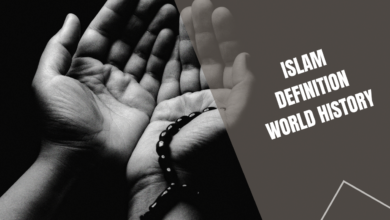
What is shirk in Islam?
Shirk in Islam refers to the act of associating partners with Allah (God) or ascribing divine attributes to anyone or anything other than Allah. It is considered the gravest sin in Islam and is strictly forbidden.

Introduction
Shirk, in the context of Islam, is a fundamental concept that lies at the heart of the religion’s monotheistic beliefs. It refers to the act of associating partners or rivals with Allah (God). Islam is a monotheistic faith that emphasizes the absolute oneness and uniqueness of Allah, and shirk is considered one of the gravest sins a Muslim can commit. This article aims to provide a comprehensive overview of what shirk is in Islam, its types, consequences, and how Muslims are advised to avoid it.
The Concept of Tawheed
To understand shirk, it is essential to first grasp the concept of Tawheed. Tawheed is the Islamic belief in the oneness and uniqueness of Allah. It is the core principle that distinguishes Islam from polytheistic religions. Muslims believe that there is only one true God, and no deity shares His divinity, attributes, or power.
Types of Shirk
Shirk is classified into two main types:
- Major Shirk (Shirk Akbar): This type of shirk involves associating partners with Allah in His divinity, attributes, or rights. It includes believing in multiple gods or deities alongside Allah. Idol worship, the worship of saints, or the belief in the divinity of objects or entities fall under this category. Major shirk is considered a grave sin and leads to eternal damnation if not repented.
- Minor Shirk (Shirk Asghar): Minor shirk is the act of performing acts that should be solely for Allah’s sake but are tainted by showing off, hypocrisy, or seeking the approval of others. It doesn’t involve associating partners with Allah in His divinity but still contradicts the sincerity and purity of faith. Examples of minor shirk include performing acts of worship to gain praise or recognition from others.
Also Check
- Patience of prophet Muhammad (PBUH)
- What are Dreams in Islam?
- Which is the companion of Hazrat Muhammad (PBUH) who was with you the most during the wars?
- Should I continue fasting if I get my period Islam?
Consequences of Shirk
In Islam, shirk is considered the most significant sin and has severe consequences. The Quran explicitly mentions that Allah does not forgive the sin of shirk unless the individual repents before their death. The consequences of shirk are as follows:
- Eternal Damnation: Those who die in a state of major shirk without repentance are believed to be condemned to Hellfire for eternity.
- Invalidation of Deeds: Committing shirk renders a person’s good deeds worthless, no matter how virtuous they may be in other aspects of life.
- Straying from the Path of Guidance: Engaging in shirk leads individuals away from the path of righteousness and guidance prescribed by Islam.
Avoiding Shirk
Muslims are strongly advised to be vigilant against shirk in all its forms. To avoid falling into this sin, they should:
- Strengthen Their Belief in Tawheed: A firm belief in the oneness of Allah is the foundation of avoiding shirk.
- Seek Sincerity in Worship: Acts of worship should be performed solely for Allah’s pleasure and not for worldly gain or recognition.
- Repent and Seek Forgiveness: If one realizes they have committed shirk, it is essential to repent sincerely and seek Allah’s forgiveness.
- Learn and Educate: Muslims should continuously educate themselves about the dangers of shirk and educate others to prevent its occurrence.
Conclusion
Shirk in Islam is the act of associating partners or rivals with Allah and is considered the most significant sin in the religion. Understanding the concept of Tawheed and the distinction between major and minor shirk is crucial for Muslims. The consequences of shirk are severe, leading to eternal damnation if not repented. To avoid shirk, Muslims are encouraged to strengthen their faith, seek sincerity in worship, and educate themselves and others about the importance of Tawheed. By doing so, they uphold the fundamental principle of Islam, the belief in the oneness and uniqueness of Allah.

FAQs About Shirk in Islam
What is shirk in Islam?
Shirk in Islam refers to the act of associating partners with Allah (God) or ascribing divine attributes to anyone or anything other than Allah. It is considered the gravest sin in Islam and is strictly forbidden.
What are the consequences of committing shirk in Islam?
Committing shirk is considered a major sin in Islam, and its consequences are severe. It can lead to the nullification of a person’s faith (iman) and the denial of entry into paradise (Jannah). It is a rejection of the core belief in the oneness of Allah.
What are some common examples of shirk in practice?
Common examples of shirk include worshiping idols or statues, seeking help or protection from other beings or objects besides Allah, and believing in intermediaries between humans and God for salvation or guidance.
Is there a difference between major and minor shirk in Islam?
Yes, Islam distinguishes between major (shirk akbar) and minor (shirk asghar) shirk. Major shirk involves ascribing partners to Allah in His divine attributes or worship, while minor shirk involves lesser forms of associating partners with Allah, like showing off in acts of worship or swearing by other than Allah.
How can one avoid shirk in their daily life?
To avoid shirk, Muslims should maintain a strong belief in the oneness of Allah (Tawhid) and refrain from any form of worship or supplication directed towards other than Allah. They should also be cautious not to engage in practices that may lead to minor forms of shirk, such as showing off or relying too heavily on material means.
Can non-Muslims commit shirk?
Shirk is primarily a concept within Islam, and it is generally not applicable to non-Muslims who do not share the Islamic belief system. However, individuals from other faiths may engage in practices that Muslims perceive as shirk due to differences in theology and beliefs.
Is there a chance for repentance and forgiveness for those who have committed shirk?
In Islam, sincere repentance and turning back to Allah with true remorse can lead to forgiveness, even for those who have committed shirk. Allah is often described as the Most Merciful and Forgiving. However, it is essential to genuinely repent and abandon shirk to seek Allah’s forgiveness.
Are there any Quranic verses or Hadiths that address the concept of shirk?
Yes, the Quran and Hadith (sayings and actions of the Prophet Muhammad) contain numerous references to the prohibition of shirk and its consequences. For example, Quranic verses like Surah Al-Baqarah (2:21-22) and Surah Al-An’am (6:151) emphasize the oneness of Allah and the rejection of shirk.
How does Islamic monotheism (Tawhid) relate to the concept of shirk?
Tawhid is the central concept in Islam, emphasizing the absolute oneness of Allah. Shirk directly contradicts this belief by associating partners with Allah, making it essential for Muslims to uphold Tawhid and reject any form of shirk.
What are some practical steps to strengthen one’s faith and avoid shirk?
To strengthen faith and avoid shirk, Muslims are encouraged to engage in regular acts of worship, increase their knowledge of Islam, seek sincere guidance from Allah through supplication (dua), and associate with individuals and communities that promote the oneness of Allah and Islamic teachings.






